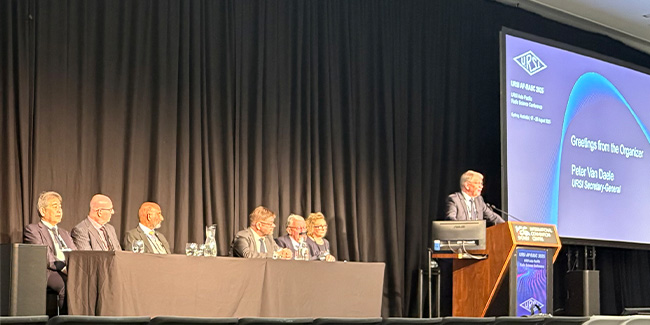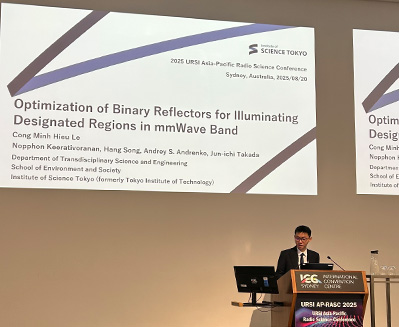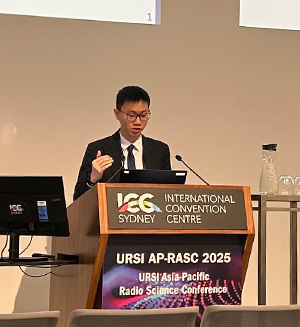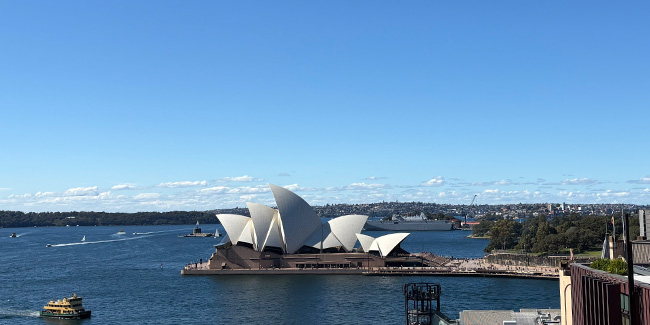The URSI Asia-Pacific Radio Science Conference (AP-RASC), organized every three years by the International Union of Radio Science (URSI), is one of the flagship conferences covering a wide range of topics in radio science. The 2025 edition was held at the International Convention Centre Sydney (ICC Sydney), located in the heart of the city, from August 17 to 22, 2025.
The program covered all URSI Commissions (A–K), spanning electromagnetic theory, radio propagation, antennas, signal processing, communications, remote sensing, and emerging areas such as AI and machine learning in electromagnetics. The conference included plenary lectures, oral and poster presentations, workshops, and student-focused events such as the Young Scientist Award and Student Paper Competition. Researchers and engineers from more than 40 countries participated, making the conference an important opportunity for academic exchange and international networking.
URSI also officially announced that the next AP-RASC conference (2028) will be held in Toyama, Japan.

I presented my research, "Optimization of Binary Reflectors for Illuminating Designated Regions in mmWave Band," in the session "Machine Learning and Optimization Techniques in Electromagnetics."
My work addresses the challenge of limited signal coverage in 5G and beyond (6G) wireless systems, which operate at millimeter-wave (mmWave) frequencies. These high-frequency signals enable fast and reliable data transmission but are easily blocked by obstacles such as walls, furniture, and even the human body.
To mitigate this problem, I proposed the design of binary reflectors: surfaces that can be fabricated easily and at low cost to redirect signals and efficiently illuminate target regions. By applying advanced optimization techniques, specifically a genetic algorithm, the reflector pattern can be tailored to improve coverage in environments where direct line-of-sight communication is obstructed.
After my 15-minute presentation, I received several technical questions from the audience. These offered perspectives beyond the feedback I had previously received from my laboratory colleagues and also highlighted some limitations in my approach. This input was valuable in identifying new directions for refining my work.
After the session, a German scientist, Dr. Andrey Osipov, approached me to discuss my research further. We discovered that we were tackling similar problems but from different methodological perspectives. He showed a strong interest in the scalability of my optimization-based approach, which could be applied to a wide range of scenarios. Our discussion developed into a fruitful exchange of ideas and opened possibilities for future collaboration.
An extended version of my conference paper will be published in URSI Radio Science Letters, which will help disseminate my research to a broader audience.


Attending AP-RASC 2025 was an enriching experience, both academically and personally. Through my presentation and discussions, I gained constructive feedback that will help me improve my research. In addition, I had many opportunities to expand my international network by meeting researchers from diverse backgrounds working on related topics.
Beyond the technical program, I enjoyed the vibrant cultural atmosphere of Sydney. Although it rained almost every day during my stay, the central location of ICC Sydney allowed me to explore the city and visit iconic places such as the Sydney Opera House during my free time. Sydney's multicultural environment left a strong impression on me, and I appreciated experiencing the city's diversity alongside academic exchange.
Finally, I would like to express my sincere gratitude to the Marubun Research Promotion Foundation for generously supporting my participation in AP-RASC 2025.

